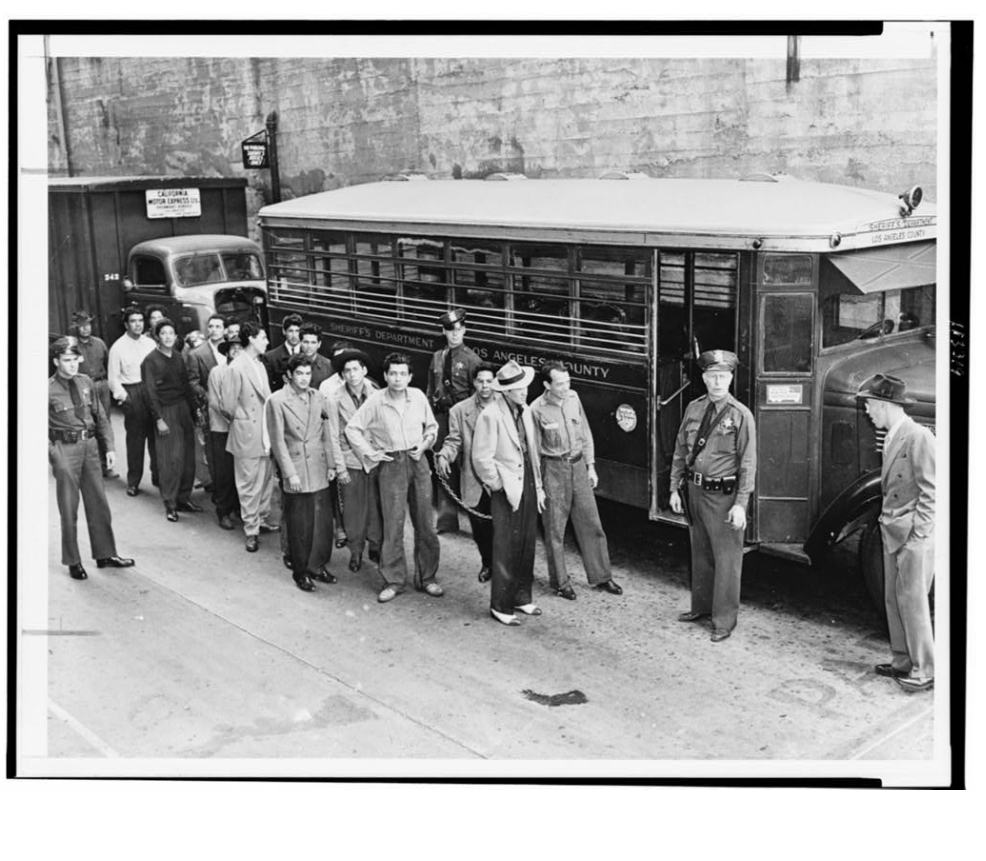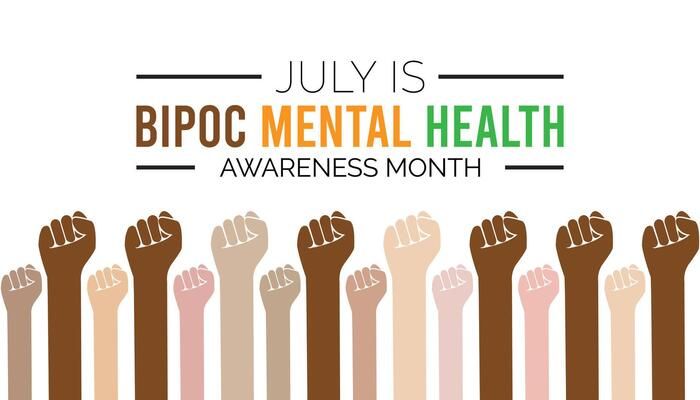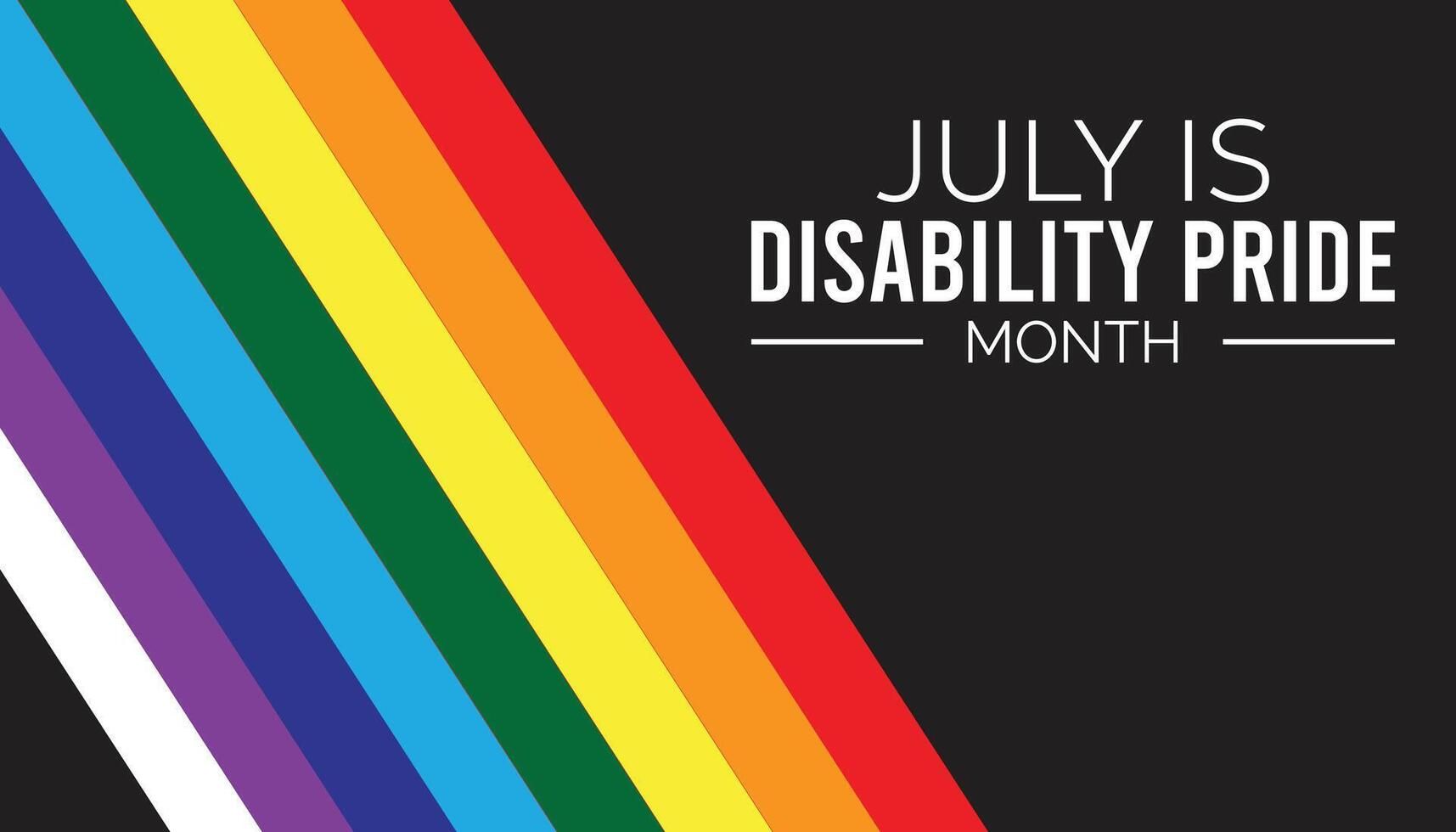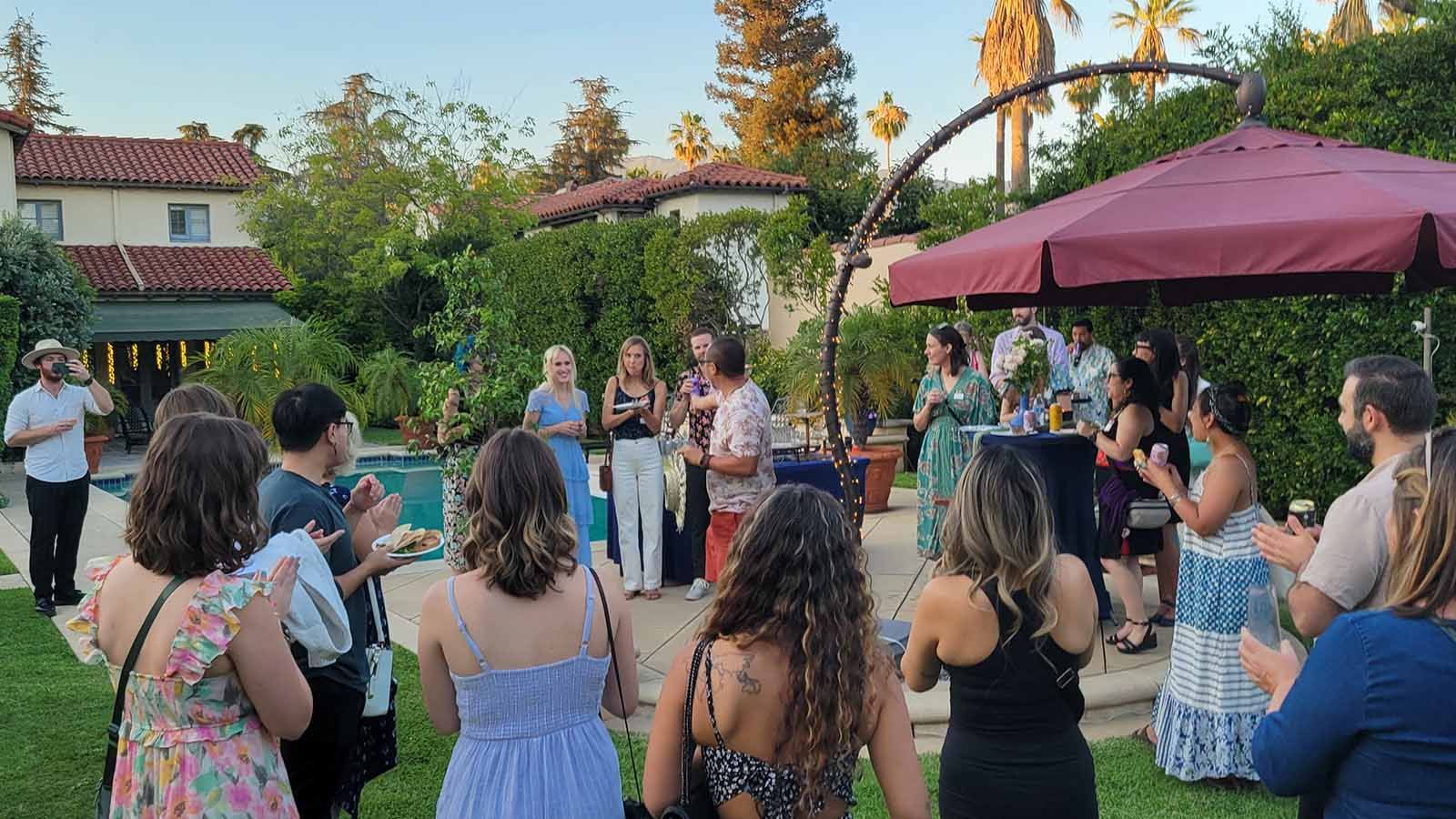
September 2025
Message From The SGVPA President
Dear SGVPA Members,
I hope this message finds you well. As we move into the final months of the year, I’m filled with immense gratitude for the incredible community we’ve built together. Our collective commitment to supporting one another and advancing the field of psychology is truly inspiring.
This season brings with it two special opportunities to connect and reflect.
Fire Relief Wellness Event
We're continuing our efforts to support members affected by the recent Eaton and Palisade fires. Please join us for a dedicated wellness event focused on healing and community support. This will be a wonderful opportunity to come together and offer our collective strength to those in need. The event will feature a range of restorative activities, including a mindful visualization session with Arianne MacBean, an expressive arts activity with Dr. Melissa Johnson, a catered lunch, followed by a soothing sound bath with Mindy Painter and a guided meditation with Amy Guthrie. Your presence means a great deal, and we look forward to sharing this time of healing with you.
January Jubilee
Mark your calendars for our annual January Jubilee on Saturday January 31st, a beloved networking tradition that provides a perfect opportunity to reconnect with colleagues, celebrate our accomplishments from the past year, and look forward to the goals we hope to achieve in the new year. We’re also hard at work planning a pre-Jubilee event to provide education opportunities, more support around fire relief as we approach the one-year anniversary, and network with colleagues more (details to be announced soon)! This year, we're excited to host the Jubilee at a beautiful new venue—a stunning Pasadena home with a ballroom all set with space to mingle and plenty of tables and seating designed for just such an occasion. I can’t wait to celebrate with you there.
As always, thank you for your dedication to our organization and to the broader community. Your involvement makes all of our work possible and my job a joy as I have the opportunity to serve SGVPA members in such meaningful ways. I look forward to seeing you at the Fall fire relief wellness retreat and the January Jubilee and send you warm wishes as we transition into Fall. May this season bring you fresh perspectives and opportunities for meaningful growth both individually and in connection with one another.
Warmly,
Shannon Thomas, PsyD
President, SGVPA

Dr. Shannon Thomas, Psy.D
Message from the SGVPA Newsletter Editor

Dr. Kristin Goradietsky, Psy. D Newsletter Editor
Please contact me at kristingorad@gmail.com if you are interested in submitting a story for our next newsletter or have a suggestion for future topics.
Topic: Mental Health Care for Immigrants: Culturally Responsive Support
Hello SGVPA Folx,
This is Emily Morales, your Diversity Chair. I wanted to share personal experiences about working with the migrant population. What you may not know is that my bachelor’s degree is in Latin American Latino Studies with a focus on Immigration. This is a group I knew one day in one way or another I'd find a way to represent or help. I am a first-generation individual. My parents migrated to this country in the 70's and 80's. They met here in the US, and the rest is history. My experience as a first-generation individual revolved around a unique role that is not commonplace for children of non-migrants in the US.
At an early age, my job was to be a translator, emissary for the household, and resource guru. I had to be fearless in a way that put me as part of the adult hierarchy in my home. I heard "You were born here, do you not know what they are saying/writing?" in conversations about adult family decisions. My family often expected me to translate letters from doctors, letters from work, mail in general, and television content. I had to ask peers, mentors, authority figures, and English language speakers on my own until my parents became fluent in the English language. The internet was not accessible to me in my home until I was a junior in high school, so resources had to come from many creative places. My education was critical for the success of my family. The pressure was intense but, in that moment, you don't understand it and just "do it."
Growing up immigration was a topic discussed at the dinner table. It can be a common experience depending on the immigration journey of the adults in the family system. There are always exceptions to the rules, and you can meet people who have never spoken about immigration until a moment of crisis. I knew of families who would not speak about immigration, and I would be told to not discuss legal status when interacting with their children in therapy. Some of those families were my aunts, uncles, cousins, who did not feel it was a safe topic to discuss in hopes of not scaring the children. The fear of disclosing the citizenship status of some members of the family was a palpable experience. Mixed status means some members of the family are citizens, some are in the process of becoming a citizen, or some have not initiated any form of naturalization in the US. Some parents never informed their children that they were not born in the US. These truths come out and sometimes can tear the family apart.
Taking from my experience when working with minors of mixed status families. I had serious conversations with the adults of the family system about what therapy entails. It was necessary to clearly delineate the limits of confidentiality. I stated very clearly and directly what DCFS/CPS means. I said that I do not report to ICE. I clearly explained the steps of a CPS and APS report. It was necessary to build rapport to clearly outline my role and purpose in their treatment goals in therapy. Mixed status homes live with intense fear. Whether from secret keeping in the home, who has what status or being upfront about everyone's status, and what could happen in the world if there were to be an ICE raid. It was essential to explain to my clients what my authority in the therapeutic alliance meant. Families will continue to open the doors to their home when you are upfront and clear about your boundaries and limitations.
In my work presently I work with adults affected in several ways by immigration. I see individuals with their own naturalization journey, individuals who are witnessing their family member's immigration journey, people who have loved ones affected by immigration status, and individuals witnessing the terror of their fellow man going through immigration raids. Immigration is a polarizing topic in all walks of life. Demonizing immigrants hurt people in many ways. Immigrants are being blamed for "the current state of our country, sadly is a classic rhetoric, and unfortunately the current scapegoat. This is not the first time people have used immigration as a topic used to rally support for nationalism and xenophobia. We have seen this across time and history. Being with the client and holding space for them to tell you about their pain, hurt, anger, distress, and family stories is part of the journey towards healing. Holding the space to go through the stages of grief, to process the anger, to challenge the feelings of helplessness, allows the therapy room to become a space of social justice.
These journeys shared in the therapeutic room are at times tough to hear and can be heavy on the heart. I encourage you to reach out to your colleagues and consult, process in your own therapy, or bring it up as a topic you want more information from your Psychological Associations. These are challenging times. Being there for each other as community members will help us share the load in a collective way. Tending to the hurts of the world is a work of heart. We do what we do because of the passions and callings we feel in ourselves. Thank you for reaching out to community members that are in need. We are in this together.
Warm Regards,
Emily Morales, LMFT, Psy.D., Diversity Chair

Dr. Emily Morales, Psy.D
Topic: Mental Health Care for Immigrants: Culturally Responsive Support Cont'd
My Background
I am a first-generation American-born Latina. I understand the political landscape and can provide a clinical lens to support the community-at-large. I have over 17 years of experience as a social worker. I conduct biopsychosocial evaluations for immigration cases, individual psychotherapy and consultative services as it relates to the mezzo-level intersection of mental health and public health.
Current Political Climate
Mental health clinicians from all over the United States may have seen an uptick for services since the change in presidential administration. During a change in administration comes a change in policies, a change in governmental leaders and a change is once-protected laws. With political upheaval comes anxiety, trauma, depression or isolation.
This current political climate has been affecting the immigrant community since well-before January 20, 2025, but it’s now manifesting due to recent enforcement of raids, changes in legalizing immigration status or fear of a loved one getting deported. Over the past several months policies have been updated without court-approval but with executive orders placing undocumented immigrants at-risk of deportation. With escalating factors coming into play during nationwide immigration raids, people are afraid to leave their once-safe home out of fear of being detained by ICE or immigration enforcement. People fear updating their status, going to immigration court for once-protected check-in hearings and fear of going to work. Their emotional anguish can be debilitating and have devastating effects in the long-run. The people I describe could very well be your client, the adult child of an undocumented immigrant, the minor child (also referred to by this administration as an “anchor baby”), or young adult with Deferred Action for Childhood Arrivals (DACA) status. This person could be the spouse of a US Citizen, the asylum-seeker, the refugee, or the highly-skilled professional at-risk of losing their H1-B Visa. All these people have a face; a face some may want to hide out of fear of persecution.
Personifying the Immigrant
Immigrants come from all over the world. Some with permanent residency, legal status, tourist visa, work visa, refugee and others seeking asylum for refuge. According to the American Immigration Council, it’s estimated there’s approximately 11 million undocumented individuals residing in the US. Some overstay their once-valid visas, some cross borders through perilous journeys, risking their lives to get to the other side. All of these individuals hope for one thing:
for a better life in the US. Individuals with once-legal status, such as Temporary Protected Status (TPS), are now being asked to leave the US after decades of living peacefully in the US. Certain class of undocumented immigrants are being financially cajoled into self-deporting with an offer of $1,000, per Department of Homeland Security. Government workers play a huge role in this: border patrol; ICE agents; law enforcement; politically-appointed judges. Once-protected
sanctuary cities such as Los Angeles are routinely fighting against enforcement; the sanctuary city or state is no longer a protective factor.
Shifting the Narrative
So how can you as a mental health specialist best support these clients coming to you under distress? Your client may not be the undocumented individual, but may be the minor child of an undocumented parent fearful of family separation, or may be the adult US citizen whose parents are undocumented. They may be the DACA recipient with a valid work permit, but fearful of coming into work. They may be the newly married spouse of the undocumented individual seeking a way for their spouse to remain in the country legally. Documenting their psychological stressors may help them if they are seeking a route to legal status. Your documentation matters and at any instance it may be subpoenaed and brought into evidence for immigration court. As a trained mental health practitioner conducting biopsychosocial evaluations to support immigration cases, I see firsthand how important it is to help the client substantiate their lived-fear and put those words into an objective report to help aid their case in immigration court. Psychotherapy is not punitive; in the case of an individual seeking legal status it may very well help their case by substantiating their mental health claims in immigration court.
Best Practices
It goes without saying but if you’re reading this article, you already come with a psychotherapeutic lens. You don’t have to convince anyone to join therapy; you know the positive effects they carry. For some undocumented individuals you’ll want to start with informed consent, establishing rapport and providing them with the assurance that they are safe, their narrative is protected and they will not be reported to immigration or law enforcement. Discussing this in the initial phone consultation or during intake will help the client feel safe and secure. Offering telehealth services is an added bonus for those fearful of leaving their home. Assuring them that they have rights and their information will be kept
confidential will help them ease into therapy. Best practices should be rooted in cultural-sensitivity and cultural-competence. Knowing how to practice within your scope, trained in trauma-informed therapy, understanding somatic work, providing EMDR therapies, CBT or evidence-based practices to help with anxiety, depression, adjustment disorder or PTSD. Familiarizing yourself with various self-administered scales (PCL-5; PHQ-9; GAD-7) will help confirm a diagnosis. The client’s mental health diagnosis is similar to any other legal-status client, the only difference is the undocumented client may have a fear of this very liberty being taken away. The liberty of seeking mental health treatment in a country that respects their self-determination and privacy without fear of judgment, persecution or
retaliation. Part of conducting psychotherapy may come with recommendations in the form of “homework,” skills-building, self-care and when necessary, referring out for case management support. For further guidance, LA County Office of Immigrant Affairs is a good starting point to find non-profit support and resources for your client. As a therapist doing what you can to help aid your client will not only make you informed but serve as an ally to the vulnerable immigrant community.
Written by:
Elda Lazaro, LCSW, MPH
Licensed Clinical Social Worker
Elda@ConSoulCounseling.com
Topic: Employing Character Strengths as Treatment Goals

Elda Lazaro, LCSW, MPH
Topic: Employing Character Strengths as Treatment Goals
Employing Character Strengths as Treatment Goals
Before it fully distinguished itself as a discipline different from philosophy and theology, psychology, like these other disciplines, endorsed the study of character—virtue, vice, will-power, self-control. In time, to improve its scientific credentials, psychology sought to distance itself from the study of character, and its implied moral foundations, settling on the more “neutral” term personality; after all, we tend not to talk of good and bad personality traits, but it is socially sanctioned to refer to good and bad character traits.
In recent years there has been somewhat of a renaissance in rendering character a legitimate area of psychological study. Burgeoning scholarship by luminaries such as Martin Seligman and Blaine Fowers have repurposed ancient Greek ideas on virtues and virtue ethics to make them applicable to contemporary human growth processes and psychotherapy. They would
contend that the line between psychotherapy and moral counseling is often a thin one, that many psychological problems are really moral injuries (e.g. psychic suffering due to human deception, betrayal, exploitation), and that mental health is consonant with a life of virtue, or good character—the intentional pursuit of virtues such as honesty, fairness, courage, forgiveness, and generosity.
In this spirit, it is often pragmatically useful to reconceptualize psychological problems in terms of underdeveloped virtues or character strengths, with improvement in these areas being conducive to personal growth. Clients are likely to generate more inspirational motivation to address their mental health problems when the diagnoses and symptoms they are afflicted with
are reconfigured as character strengths in need of improvement, rather than seen as neuropsychological conditions requiring better coping skills to live with: in the case of ADHD, more perseverance; OCD, more open-mindedness; narcissistic proclivities, increases in humility and modesty; perfectionism, greater self-forgiveness. The motivational boost associated with
focusing on the cultivation of virtues or character strengths stems from the fact that it is a prideful enterprise; meaning, clients can take pride in achieving praiseworthy behavior.
One character strength that clients often struggle with that has mental health and wellness implications is courage. Psychological courage can be thought of in terms of constructively and productively engaging inner fears and anxieties to deny them the power to overshadow important life decisions. During courageous acts people are palpably aware of the risks—rejection, ridicule, indifference—but hold out hope that with fortitude and determination a favorable outcome will ensue.
One of the least appreciated forms of psychological courage pertains to making one’s covert love for an intimate partner more overt, refraining from succumbing to avoidance. To act on muted desires and reach out to hold a hand, offer a kiss, prolong eye contact, settle into a conversation, express gratitude, declare undying commitment. These are what Gottman, the
couples therapy guru, aptly names “bids for connection.” They carry a risk of rejection but also a hoped for reward—enhanced closeness and intimacy. Couples therapy can be enriched if the therapist frames bids for connection as a form of courage.
During a recent couples therapy session with two middle-age spouses, the husband looked furtively in his wife’s direction and sheepishly reached out to touch her hand. Noticing the delicacy of the gesture I coaxed him to not just share but elaborate on what he was feeling. He spoke glowingly of his love for his wife and how fortunate he was to be married to her. They
both embraced. I answered with a comment like: “I noticed how you took a risk fully expressing your love, not knowing how it would land. Your courage paid off!”
Suffice to say, psychotherapy can be a venue for clients to obtain confirmatory feedback for optimal displays of character virtues, experiences that incrementally congeal into a self- experience of being a good person, living a good life. It involves the therapist being prepared to listen with a moral ear to the latent and manifest moral themes in clients’ narrations. Perceiving examples of integrity, open-mindedness, persistence, forgiveness, humility, appreciation, gratitude, humor, creativity, or any number of other praiseworthy character strengths, and responding with vitalizing attunement. More often than not, this is best enacted with heartfelt, enthusiastic, pithy affirmations: “Bravo! Good for you! That was impressive! You should be proud of yourself! You’re a braver person than I! You showed amazing judgement! You outdid yourself this time! Your efforts really paid off! You didn’t let the usual fears get in the way! What integrity you showed! Now that’s perseverance! I hope you are proud of yourself!”
Setting aside the importance of deeper psychodynamics—which of course has its place—sometimes the best way to counteract a client’s weaknesses is to accentuate their strengths.
Written by Enrico Gnaulati Ph.D
Enrico Gnaulati Ph.D., is a clinical psychologist based in Pasadena, California, and Affiliate Professor of Psychology at Seattle University. He has published five books, a host of journal and magazine articles, and his work has been featured on media outlets nationwide. As a blogger for Mad in America and PsychAlive, board member for the Psychotherapy Action
Network (PsiAN), ceu provider for ContinuingEdcourses.net, and through his writings and advocacy efforts, he is considered a nationally recognized humanistic reformer of mental health policy and practice.

Dr. Enrico Gnaulati, Ph.D
SGVPA Recommendations: Books
Lying on the Couch - Irving Yalom’s novel about therapists and supervisors and spouses with interweaving stories — with a fitting double entendre title !! Enjoying it thoroughly on Audible. Recommended by Dr. Andrea Davis
The Gift of Therapy by Irvine D. Yalom - amazing book about how to get the most out of therapy for the client and therapist :) a colleague of mine called it the psychologists chicken soup for the soul. Recommended by Ossanna Amran

Upcoming Events: SGVPA Wellness Retreat for Fire Relief: September 27
I
SGVPA would like to sincerely invite you all to our Wellness Retreat for Fire Relief on September 27 from 9:30am to 2pm. We will be providing several sessions to help process our varied experiences with the Eaton Fire, connect to our inherent resiliency, and promote mindful meditation. We hope to lean on the strength of our SGVPA community to gather together and share in our communal and individual recovery.
This is a public event and you are welcome to share this invitation with fellow colleagues. Be sure to secure your spot by rsvping here.
Here is the schedule of events:
1. A brief welcome reception will begin at 9:30am with light refreshments provided.
2. The first session begins at 10am and is a mindful, body-based visualization session led by Arianne MacBean, LMFT.
3. Following that, Dr. Melissa Johnson will guide an expressive arts activity focused on images of strength, resilience, and hope at 11am.
4. A complimentary Lunch will be available starting at noon.
5. Our last session of the day will begin at 1pm and will include a sound bath led by Mindy Painter and a guided meditation led by Amy Guthrie, APSAT.
Feel free to reach out to me if you have any questions about the day's events/activities or if you would like to volunteer on the day of the retreat.
Please go to https://www.sgvpa.org/events to reserve your spot!

Awareness Months
June:
Lesbian, Gay, Bisexual, Transgender, and Queer Pride Month
Let's show support to our LGBTQ2SIA+ Community Members!
This is the month to show your pride and allyship to our SGV LGBTQ2SIA+ community. The month of June was selected for PRIDE month in honor of the June 28, 1969 Stonewall Uprising. For more information on the history of LGBTQ2SIA+ pride month please check out the Library of Congress. Visibility of "The Second Largest Minority," Library of Congress Article, was built on the backs of social activists in the queer community. The suffering and pride of our queer community has led to some of the greatest grassroots changes that have shifted the narrative of the queer community. Stand up against stigma, erasure, and marginalization by checking out some resources, advocating, and being an affirming therapist.
Resources in Becoming an LGBTQ2SIA+ Affirming Therapist
Even if we graduated last week or a decade ago including more tools and staying up to date with the research and training is the first step in becoming and remaining an affirming therapist. Check out these resources to continue your life-long learning experience.
The Safe Zone Project
https://thesafezoneproject.com/
A free online resource offering LGBTQ+ inclusion and allyship trainings, with downloadable curricula, activities, and facilitator guides to create welcoming environments.
The Trevor Project – Public Education
https://www.thetrevorproject.org/public-education/
Offers free educational resources focused on supporting LGBTQ+ youth, including allyship guides, webinars, and training modules to promote mental health and suicide prevention.
PFLAG – Advocacy at All Levels
https://pflag.org/resource/pao-advocacy-all-levels/
A resource from PFLAG that has tools and strategies for advocating for LGBTQ+ rights at local, state, and national levels, designed to empower allies and community members.
Paid Online Trainings
The Affirmative Couch
https://affirmativecouch.com/
Provides continuing education courses for mental health professionals focused on culturally competent care for LGBTQIA+, consensual non-monogamy, and kink communities.
OutCare Health – LGBTQ+ Cultural Competency Training
https://www.outcarehealth.org/training/
Offers a paid certification program for healthcare professionals to improve their understanding and inclusivity of LGBTQ+ patients in clinical settings.
Crisis Resources and Mental Health Resources
Mental Health Resources
Los Angeles LGBT Center
https://lalgbtcenter.org/services/mental-health-psychiatry-services/ | (323) 993-7500
Offers mental health and psychiatry services for LGBTQ+ individuals in Los Angeles, including therapy, support groups, and psychiatric evaluations.
National Queer & Trans Therapists of Color Network (NQTTCN)
https://nqttcn.com/en/
Connects queer and trans people of color with affirming mental health practitioners and provides a space for therapists of color to build community and access resources.
Gay Therapy Center
https://www.thegaytherapycenter.com/
Specializes in providing LGBTQ+-affirming therapy services with licensed therapists in major cities and online, focusing on relationships, identity, and personal growth.
Crisis Resources
The Trevor Project
https://www.thetrevorproject.org/ | (866) 488-7386
A national organization providing crisis intervention and suicide prevention services to LGBTQ+ youth, available 24/7 via phone, text, and chat.
Trans Lifeline
https://translifeline.org/ | (877) 565-8860
A peer support crisis hotline run by and for trans people, offering emotional and financial support to the trans community.
LGBT National Help Center
https://glbthotline.org/ | (888) 843-4564
Provides confidential peer-support phone lines and resources for LGBTQ+ individuals of all ages, including youth and seniors.
Pride Institute
https://pride-institute.com/ | (833) 403-5400
A treatment center specializing in LGBTQ+ affirming recovery services for substance use, sexual health, and mental health issues.



June Cont'd:
June 3-8th, 1943 marks the 82nd year anniversary of the Zoot Suit Riots. Very reminiscent to the anti-immigrant rhetoric and racial tension in Los Angeles today. White U.S. servicemen and police officers descended upon a majority-Mexican American neighborhood in East Los Angeles, California, and harassed, beat, and detained hundreds of Mexican American youth. The violent riot was fueled by centuries of colonialism and white supremacy.
With the current political climate, ICE raids, National Guard being deployed, Marine's being deployed, and people being unlawfully detained I felt that it was urgent to point to a historical parallel. The police, servicemen, and anti-immigrant xenophobic propaganda boiled over and targeted Mexican American, African American, and Filipino American zoot suiters. There were non-zoot suiters that were targeted during these racial riots. To learn more check out the Huntington Archives on the zoot suit riots. The Huntington Archives. Check out an original Zoot Suit at the LACMA.
Resources for Undocumented Folks
With the protests, ICE detainments, and xenophobic rhetoric people need to be aware of their rights and what to do if the worst case scenario were to happen.
Undocumented People Resources:
Immigrants Rising https://immigrantsrising.org/
Provides undocumented students with resources, scholarships, and guidance to help them pursue education and careers, regardless of immigration status.
CHIRLA (Coalition for Humane Immigrant Rights) https://www.chirla.org/
Advocates for immigrant rights through community education, legal services, and policy change to support full inclusion of immigrants in society.
CARECEN (Central American Resource Center) https://www.carecen-la.org/
Offers legal services, education, and advocacy for Central American and other immigrant communities, seeking to empower and defend their rights.
Immigrants Are LA https://www.immigrantsarela.com/knowyourrights
A coalition that promotes immigrant inclusion in Los Angeles, offering "Know Your Rights" resources and community support to assure immigrants are informed and protected.
Crisis Resources: What to do if a loved one is detained?
Crisis Resources:
National Immigrant Justice Center https://immigrantjustice.org/for-immigrants/know-your-rights/what-do-if-you-or-loved-one-detained/
This resource guides families through immediate steps when someone is detained by immigration.
National Immigration Law Center https://www.nilc.org/resources/know-your-rights-what-to-do-if-arrested-detained-immigration/
This multilingual "Know Your Rights" guide outlines what documents to carry and what to do if you’re stopped, detained, or arrested by immigration.
ACLU https://www.aclu.org/know-your-rights/immigrants-rights
This ACLU page emphasizes that immigrants have constitutional rights regardless of status, providing a central hub to learn about these rights and related topics.
Stop AAPI Hate https://stopaapihate.org/2025/03/21/know-your-rights-with-ice/
This guide, published March 2025, offers tailored advice for Asian American and Pacific Islander communities about how to respond if approached by ICE in public or at home.


July:
BIPOC Mental Health Awareness Month
July is BIPOC Mental Health Awareness Month. July is dedicated to the mental health of the BIPOC community. With the website below you can download the BIPOC mental health toolkit in both English and Spanish. Check out these resources today! Please feel free to share with colleagues, clients, and community members.
"Each July, we honor the legacy of author, advocate, and trailblazer Bebe Moore Campbell by recognizing Bebe Moore Campbell National Minority Mental Health Awareness Month (also referred to as BIPOC Mental Health Month). Moore Campbell’s ability to tell impactful stories highlighting themes of racism, mental health, and family left a lasting mark on this world and is a foundation for much of the work that continues in support of Black, Indigenous, and people of color (BIPOC) mental health." -
https://mhanational.org/bipoc-mental-health/bipoc-mental-health-month/
Together we can advocate for marginalized groups. Together we can continue providing awareness and resources for all those in need within our community, people in our virtual community, advocacy with family and friends, and networking with each other to keep us all together in support for our community.

July Cont'd:
Disability Pride Month
July commemorates the signing into law of the Americans with Disabilities Act. Which gives us an opportunity to learn how to be a support to those with disabilities in our community. The Easter Seals website is a great resource for clients seeking support for their disabilities. It is a resource worth getting acquainted with. Check out these resources today! Please feel free to share with colleagues, clients, and community members.
"On July 26,1990, after a hard-fought battle from disability advocates and allies, the Americans with Disabilities Act (ADA) was signed into law. This landmark legislation ensured disabled people had greater access to employment, transportation, and the community. The first official Disability Pride celebration was in 2015, on the 25th anniversary of the ADA. Now, every July, we celebrate Disability Pride Month to center and celebrate disabled people." -
https://www.easterseals.com/southerncal/support-and-education/disability-pride/
Differently abled people are part of our community sharing lives side by side with regularly abled folx. They are a vibrant community of individuals with so much to offer. We honor them by acknowledging their contributions to the world and their communities.

August:
August is National Wellness Month
I invite you all to take an opportunity to introduce some wellness into your life. The resources for this month are to include self-care into your daily life and professional life. As therapists we are all part of the frontline response to many clients and families. This is an opportunity to model and practice wellness to your clientele. As well as water your own inner well within. Wishing you all wellness in the coming months.
This link is for the incorporation of wellness in the workplace:
https://www.kudoboard.com/blog/national-wellness-month-activities-for-a-healthier-workplace/
This link is for the incorporating wellness all year long:
This is a link with five weeks of wellness:
https://www.achievers.com/blog/national-wellness-month/
Together we can tend to ourselves, our clients, and the San Gabriel Valley. I firmly believe we can all lead by example and these are some great resources to lead the way for wellness for the rest of the year. I look forward to seeing you all in September at our SGVPA Wellness Retreat for Fire Relief.
Sincerely,
Emily Morales, Psy.D., LMFT, Diversity Chair

September:
September is Hispanic Heritage Month
September is the start of Hispanic Heritage Month. Hispanic Heritage Month starts September 15th through October 15th. Although the name is Hispanic Heritage it is meant to capture Latino/a individuals. "Hispanic usually refers to people with a background in a Spanish-speaking country, while Latino is typically used to identify people who hail from Latin America." - https://www.verywellmind.com/what-is-the-difference-between-hispanic-vs-latino-5082005
The resources presented will be ways to celebrate and honor the Hispanic Latin@ population, resources to inform yourself on what to do with anti-Hispanic/anti-Latino sentiment, and access to Spanish language resources.
"Hispanic Heritage Month is celebrated each year from September 15 to October 15. It began as a week-long celebration in 1968 under President Johnson and was expanded to a month by President Reagan 20 years later in 1988. The month-long celebration provides more time to properly recognize the significant contributions Hispanic/Latino Americans have made in the United States.." -
https://latino.si.edu/learn/teaching-and-learning-resources/hispanic-heritage-month-resources/hispanic-heritage-month
Due to the current political climate it is very important to bring up anti-Hispanic anti-Latino rhetoric. We have been watching what hate does to our communities. The xenophobic rhetoric is right here in our backyards impacting communities of color. You can read up on the long history of anti-Hispanic anti-Latino rhetoric.
https://www.history.com/articles/the-brutal-history-of-anti-latino-discrimination-in-america
Hispanic Latino Trauma Toolkit
https://www.psychiatry.org/psychiatrists/diversity/education/stress-and-trauma/hispanics
Together we can be advocates and allies for our Hispanic and Latino population. We can celebrate the diversity and contributions of the Hispanic and Latino community. We honor those that stood up for human rights and fought for our place in our communities. The Los Angeles area, the San Gabriel Valley, California, the South West all benefit from the contributions of our Hispanic and Latino community members.
https://latino.si.edu/learn/teaching-and-learning-resources/hispanic-heritage-month-resources/hispanic-heritage-month#celebrate
Here are resources for the Hispanic and Latino community:
https://namica.org/resources/latino-a-x-resources/
https://afsp.org/story/mental-health-resources-for-hispanic-and-latinx-communities
https://www.hispanicfederation.org/our-work/health/mental-health-resources/
Spanish Language Resources:
https://mhanational.org/resources/recursos/
https://www.psychiatry.org/patients-families/la-salud-mental
https://www.samhsa.gov/sites/default/files/spanish-language-resources-obhe-10202020.pdf
Sincerely,
Emily Morales, Psy.D., LMFT, Diversity Chair




A special thanks to Dr. Emily Morales Psy. D who provided the resources listed in this newsletter!
SGVPA Membership Information
San Gabriel Psychological Association
membership is active for 1 year from date of joining/ renewing membership pricing:
Affiliate: $ 175 . 00
Associate: $ 175 . 00
Emeritus: $ 45 . 00
Licensed: $ 200 . 00
Newly licensed: $ 145 . 00
Out of region: $ 75 . 00
Student: $ 40 . 00
Unlicensed/ post- doc: $ 120 . 00
Please see website to join SGVPA or renew membership
SGVPA Membership
Benefits of Your Membership
Monthly Luncheons
Featuring engaging speakers on topics that are relevant to mental health and provide the opportunity for continuing education units if you choose. The only CPA chapter that provides monthly gatherings like this, SGVPA wants to give its members consistent opportunities for CE’s and networking, all in an atmosphere of fine dining.

Monthly CPD
Featuring engaging speakers on topics that are relevant to mental health and provide the opportunity for continuing education units if you choose. The only CPA chapter that provides monthly gatherings like this, SGVPA wants to give its members consistent opportunities for CE’s and networking, all in an atmosphere of fine dining.

Mentorships
Mentoring is a feature of our organization! If they choose, students and early career psychologists are given the opportunity to meet with seasoned clinicians on a regular basis to ask questions, develop friendships, and feel supported.

Community
SGVPA cares about the community around us! Various community projects attempt to interface with the local community, providing important mental health resources to those in need.

Advocacy
Each year, important and vital legislation that impact mental health is being monitored by the California Psychological Association and we want to keep our members informed! SGVPA also regularly meets with local legislators to discuss these issues and invites them to various organizational meetings.

Networking Events
These are abundant at SGVPA. Throughout the year, SGVPA sponsors a plethora of lunches, happy hours, and evening events, allowing our members plenty of opportunities to network their services, develop friendships, and feel connected to the family that is SGVPA!

Special Interest Groups (SIGs)
SIGs are something that SGVPA also offers its members. With meetings typically occurring on a bimonthly basis, members can attend any SIG of their choice! Our current Special Interest Groups include Professional Networking; Neurocognitive, Psychoanalysis, and Feminism. We are always open for more SIG ideas.

Member-Exclusive
Advertisements
Come Advertise With Us
Members and others are encouraged to take advantage of the opportunity to advertise to nearly 200 SGVPA folks!
Please see fees below
Members receive one (1) complimentary classified ad in the Newsletter per calendar year!
Advertising Fees for SGVPA Newsletter

Editorial Policies
- Analyze This! seeks high quality submissions on topics of interest to SGVPA members. This includes but is not limited to topics directly related to clinical practice, policy and legal developments, psychological theory, and psychological research. Articles need to be culturally sensitive, professional, and free of overt self-promotion. Contributors do not necessarily need to be SGVPA members to be granted publication. In general, submissions must not exceed 750 words.
- The Editorial Staff coordinates decisions on content with the SGVPA Board, although it does not function solely as a direct vehicle of the Board.
- The Editorial Staff reserves the right to accept or reject articles or advertising, based on its judgment of suitability for the Newsletter. The Editorial Staff also reserves the right to delay, defer, or cancel publication of any given article, based on space, theme, content, or other editorial considerations.
- The Editorial Staff reserves the right to edit, revise, or shorten all articles and advertising submitted, as a condition of publication. Editing may address issues such as readability, interest to readership, and scholarly concerns. Contributors retain the right to approve edits and revisions, or to withdraw such articles or advertisements from submission.
- The Editorial Staff reserves the right to grant contributors the privilege of “regular columns” to certain members. However, not all regular columns will necessarily be published in every issue, and these columns may be rotated, to allow other valuable columns and other content to be included.
- Contributors whose submissions are to be published are asked to submit a high resolution (300 dpi or higher) digital photo file (e.g., jpeg, bmp or gif). Photos embedded in Word files cannot be used.
- Current and Past issues of Analyze This! will be made available on the SGVPA website. However, any instances of publishing personal info, especially home addresses of members, will NOT be published as part of the issue (i.e., such info will only be included as insert pages, which will not be reproduced on the website).
- From time to time, the Editorial Staff may introduce a specific theme for an issue of Analyze This! We will inform the community of upcoming themes in the newsletter, i.e., to generate interest, and to invite contributions.
- The deadline for submissions to be considered for publication will normally be on the first day of each month preceding publication. Four issues of Analyze This! are published each year, in September, December, March and June.
- Submissions for possible publication should be sent to Dr. Kristin Goradietsky, Editor, as an email attachment. Correspondence, and Letters to the Editor for Analyze This! should also be sent to Kristingorad@gmail.com.
